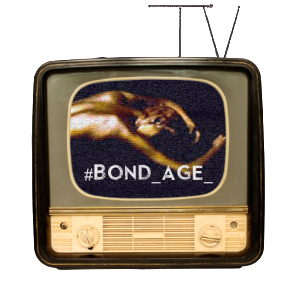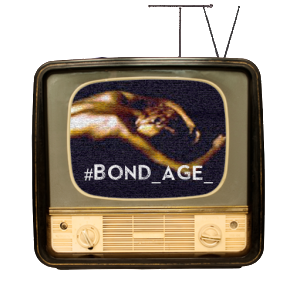by Greg McCambley | Apr 14, 2015 | #Bond_age_TV, The Man from U.N.C.L.E.

After bidding adieu to April Dancer, we merry few went back into action with Napoleon and Illya in The Apple A Day Affair. In keeping with the seriousness of the show, UNCLE found themselves facing down the most dreaded menace THRUSH could send at them: exploding apples and hillbillies. It was as incredible as it sounds. Don’t believe me? Read on!
(more…)
by Greg McCambley | Apr 14, 2015 | #Bond_age_TV, The Man from U.N.C.L.E.

This past week’s #UNCLEtweet was supposed to be a celebration as we bid farewell to April Dancer, the Girl from UNCLE. In her time as part of the livetweets, she has, more often than not, failed to impress us, often being overshadowed by her co-stars. So saying goodbye was supposed to be a time to celebration. However, a technical disaster virtually wiped out the website, and the livetweet almost didn’t happen. Thanks to the efforts of site founder @007hertzrumble, though, the videos went back up, and the livetweet went on as scheduled. There were three of us around to watch, myself, @thisannkarin, & @AllieEG. To our surprise, April acquited herself well in this episode, as she was constantly at the forefront, doing her job exceedingly well. If all the episodes had portrayed her as well as this one did, the show might have lasted longer. As it is, this was April’s final bow in #UNCLEtweet, and for that, we’re grateful. Now on with the digest!
(more…)
by 007hertzrumble | Apr 9, 2015 | #Bond_age_TV, The Man from U.N.C.L.E.
 This Week in Uncle Live Tweet Event – March 19-25, 1967
This Week in Uncle Live Tweet Event – March 19-25, 1967
Hello again, everyone! It’s #UNCLEtweet time again, and this week we’re finally going to say goodbye to April Dancer as we conclude our Girl from UNCLE livetweets. I know that, for a number of people, this is a moment we’ve been waiting for. I think that, while it certainly deserved a role in our livetweets, Girl was a remarkably underachieving show. For this week’s pairing, I went back to the week of March 25, 1967. On Tuesday the 21st, the Girl from UNCLE was involved in The Double-O-Nothing Affair. Mark and April find themselves having to retrieve vital info stolen from THRUSH which Mark lost. Friday of that week, The Man from UNCLE faced The Apple A Day Affair. Napoleon and Illya have to destroy a cache of explosive apples created by THRUSH. It should be an interesting livetweet, and I hope you’ll join me this Wednesday, April 8th, starting at 9pm EST. Don’t forget to use the hashtag #UNCLEtweet!
The Double-O-Nothing Affair – #UNCLEtweet
The Double-O-Nothing Affair by greg_mcc
The Apple-A-Day Affair – #UNCLEtweet
The Apple A Day Affair by greg_mcc
by Greg McCambley | Jun 2, 2014 | #Bond_age_TV, #Bond_age_TV, Live Tweet Digests, The Man from U.N.C.L.E.
The Man From UNCLE “Yukon Affair” Live Tweet Digest
The second episode of last Wednesday’s double bill was the first second season episode covered in #Bond_age_TV, and the second episode in colour. After the zany antics in Britain (by way of LA), Solo and Kuryakin had to head off to the cold of northern Canada to face off against G. Emory Partridge (George Sanders) once again in “The Yukon Affair.” They truly left no Canadian cliché unuttered, but they do get neatness points for showing they actually did some research. Plus we meet a female Eskimo woman named Murphy. Enjoy!
(more…)
by Greg McCambley | Jun 2, 2014 | #Bond_age_TV, #Bond_age_TV, Live Tweet Digests, The Man from U.N.C.L.E.
“The Gazebo in the Maze Affair” Man From UNCLE Livetweet Digest
Last Wednesday, the #Bond_age_TV crew got together for a special double header of episodes featuring legendary actor George Sanders. It was a red letter day for #Bond_age_TV because almost 10 people joined in the fun! First up was season one’s “The Gazebo in the Maze Affair,” featuring George Sanders and Jeanette Nolan as two of looniest homicidal English aristocracy you’ll ever meet.
(more…)
by Greg McCambley | Jun 1, 2014 | #Bond_age_TV, The Man from U.N.C.L.E.

Bond_age_TV Snoopathon Special – The Man From UNCLE

In 1960s television, a genre was created the likes of which programmers had never seen before: the superspy genre. Over the course of the decade, TV producers were hungry for any kind of spy programs they could find. This was particularly true of American producers. When not creating shows of their own (Mission: Impossible, It Takes A Thief, etc.,) they were busy importing spy shows from other countries, particularly UK shows like The Avengers, Secret Agent, and The Saint. They also produced superspy westerns (The Wild Wild West), and superspy comedies (Get Smart). The Man From UNCLE (1964-1968) was the first of the homegrown US superspy shows. In a newly-formed genre, it had the potential to become one of the biggest successes TV had ever seen. Instead, it petered out after 4 seasons, losing ratings as it went on, finally being cancelled during a shortened 4th season. And yet, it has managed to live on as a pop culture touchstone, and is a show still entertaining to this day. The reasons for UNCLE’s successes and failures will be the focus of this essay. To start, we must look back at the show’s beginnings, and its connections to the best superspy out there: James Bond.
James Bond is a cultural phenomenon. Between the books and the movies, he has remained a name that is known worldwide. He transcends borders and languages. His creator, Ian Fleming, has become as much of a known name as Bond. When television producers in the 1960s were looking for ideas for spy shows, one producer, Norman Felton, approached Ian Fleming himself looking for suggestions. Amongst the ideas that Fleming put forward were two characters: Napoleon Solo and April Dancer. Before his full suggestions could be implemented, though, trouble developed from the producers of the Bond films. They felt Fleming was undermining their franchise by working with Felton. As a result, Fleming had to step away from the producers of UNCLE, and they had to work out their own format. The UNCLE producers were, however, allowed to keep the names that Fleming had suggested. The task of developing the show fell to Sam Rolfe, a veteran TV writer and producer. By late 1963, a pilot was shot. It was called SOLO, and featured Robert Vaughn in the starring role of Napoleon Solo.
The pilot was The Man From UNCLE in all but name. Sam Rolfe’s plot pitted UNCLE against their arch enemies THRUSH, and contained all the elements that UNCLE episodes would feature for its entire run. The most important element Rolfe developed was the use of “innocents” in the plot, who could be used wittingly, or unwittingly, by both sides. To further bolster the superspy image of the show, the “innocents” were most often beautiful young women. The pilot also established the casting of well-known actors from TV and movies as either innocents or the villains. The pilot also featured David McCallum as fellow UNCLE agent Illya Kuryakin, a Russian working for UNCLE. His role, though small, was a crucial one. Despite the pilot being completed, it never aired. Instead, it was retooled slightly, with a couple of key character changes, the first being McCallum being made a series regular. The second change involved giving UNCLE a new boss, played by Leo G. Carroll (best known for North by Northwest). With these changes, the pilot was cut down to a broadcast standard length, and finally aired as “The Vulcan Affair” on September 22, 1964. The show’s title went from SOLO to The Man From UNCLE. It was not an instant success.
Despite the pilot being shot on film, season 1 of UNCLE was broadcast only in black & white. It also didn’t get huge ratings when it began. Gradually, though, it was able to build up its profile with the audience. One reason for this was that MGM, the show’s home studio, had an eye on potential revenue from Man From UNCLE feature films. The films consisted of the same broadcast episodes, but with special scenes and more adult situations than network TV would allow. The pilot, never aired, was recut with scenes added, and released as To Trap A Spy (1964). The movies, initially sent out to American audiences, proved to be great successes overseas, and helped make international sex symbols out of the two leads. This development helped UNCLE to solidify its success at home too. The charm and charisma of Vaughn and McCallum helped make them one of TV’s best duos. They were partners, friendly, but also willing to one-up one another. They had a great rapport, and were entertaining to watch. The talent behind the screens also helped to make the show a great success. The scripts were witty, yet also serious when required. By the end of season 1, UNCLE had managed to overcome its initial listlessness into one of the strongest shows on TV.
From season 2 onward, UNCLE moved away somewhat from the somewhat serious tones of season 1 towards a more tongue in cheek approach. It was broadcast in colour, which added to the lightening of the stories. But UNCLE was facing a bit of a problem backstage in the production office. Starting with season 2, The Man From UNCLE faced a veritable merry go round of producers. Season 1 had one producer (Sam Rolfe); season 2 had 3. Each producer had a different vision for the show, so when most shows need consistency, UNCLE had none. When it finally did get some consistency, it was for all the wrong reasons. Partway through season 2, the Batman TV series arrived, and became a ratings smash. UNCLE’s network wanted the program to establish a similar tone, so outlandish premises soon became the order of the day. What worked for Batman, however, didn’t work for UNCLE. It lost steam over the next 2 seasons, and despite an attempt to return the show to its original tone, it was cancelled partway through season 4. It was a sad end to a fun series.
The Man From UNCLE, despite only lasting four seasons, remains a fun series to watch to this day. There was an energy on the show that is noticeable, and the talent behind it remains high. The casting was strong all around, especially in some of the guest star casting. The talent behind the scenes also helped make the show a great success. Writers such as Dean Hargrove and Harlan Ellison scripted episodes, and directors like Alf Kjellin and Joseph Sargent made the episodes fun to watch. The show spawned a short-lived spinoff (The Girl From UNCLE), comic books, novels, feature films, and countless other things. People who watch the show will likely never forget it. And, for a show that didn’t last as long as it could (or should) have, that’s saying something.



